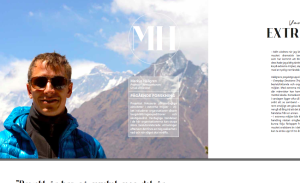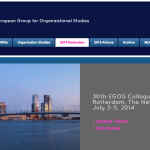Today Markus had the pleasure to present a paper on boredom and the formation of routines. Great audience with plenty of good comments!
Ny doktorandtjänst inom TripleED ute/New doctoral student position in TripleED available
Become a doctoral student and join the TripleED team and study the transformation of the Swedish police force!
Sök doktorandtjänsten och studera tillsammans med TripleED förändringen av den svenska polismyndigheten! Sista ansökningsdatum 1:a december. För information om tjänsten se, här.
Co-organizing and attending workshop on organizing and strategizing in extreme environments at HEC Montreal
Markus, Mattias, Thomas, Martin and Elmar participates in the workshop co-arranged by TripleED, GePS and Ceros. Extremely interesting line-up in terms of researched contexts and theoretical elaborations. See program here: 201401009_Progam_WorkshopExtremeContexts and description below.
******
Description: In a global world characterized by uncertainty and ambiguity, managers, workers and stakeholders have to deal with extreme situations « where risks of severe physical, psychological or material consequences (e.g., physical harm, devastation or destruction) to organizational members or their constituents exist » (Hannah et al., 2009). These situations impacts major loss or damage, directly (material, people) or indirectly (human health, economic situation, etc). Examples are major political or financial collapses, disasters, catastrophic environmental accidents, risk-taking events, expedition and rescue work, emergency situations and so on. As these contexts are outside the norms, practitioners have to perform their tasks according to a high level of stress, imagination and performance. Therefore, these contexts are of great relevance for better understand how they are strategizing and organizing in their day-to-day activities and practices. Ironically, practice researchers have until now pay scant attention to these contexts as they continue to look at conventional corporate and organizational settings.
The workshop will gather researchers interested in studying strategizing and organizing practices and activities happening in extreme contexts. Three types of contexts will be looked at: disruptive, risky or emergency. Disruptive contexts refer to environments in which individuals and groups have to deal with unexpected crises, accidents or unforeseen events that are outside the scope of their “normal” activity, such as (e.g. war, natural disasters, acts of terrorism, cyber attacks, nuclear accidents, or humanitarian situations). Risky contexts has to see with environments characterized by a high-level of uncertainty and potential danger that might can threaten the personal safety or have huge material, physical or psychological consequences for organization members who are performing their tasks in these contexts, (e.g. polar- and mountaineering expeditions, military operations, spatial explorations, oil exploitation in Artic or other high-risk management situations). By emergency contexts, we particularly refer to professional organizations that are daily engaged in managing emergency situations and where the risk concerns mainly the “client” or are part of their “normal” routine tasks (e.g. hospitals, police, firemen and so on). The workshop will be devoted to share theoretical and methodological expertise and related to the challenges and opportunities of researching in extreme contexts through a practice lens.
The workshop will be organized around plenary and parallel sessions related to each context. Plenary session will be devoted to presentation by researchers having already published some work related to these contexts. In parallel sessions, researchers will share their project, researches and work in progress together.
Presentations at UQAM in Montreal
Markus, Mattias and Thomas gave a number of presentations the other day at UQAM regarding the current research, but also the Scandinavian approach to project research, and the later developments of such approach. Very interesting discussions and great feedback from the project people at UQAM!
Markus to participate as a panelist at the “Sustainable Summits” conference in Golden, Colorado
 The American Alpine Club is hosting a summit of land managers, climbers, planners and scientists representing the world’s mountainous regions. The conference focus is to shape and share environmentally sustainable solutions in mountain areas along with developing global partnerships. Sustainable Summits builds on the successful July 2010 AAC-hosted conference “Exit Strategies: Managing Human Waste in the Wild.”
The American Alpine Club is hosting a summit of land managers, climbers, planners and scientists representing the world’s mountainous regions. The conference focus is to shape and share environmentally sustainable solutions in mountain areas along with developing global partnerships. Sustainable Summits builds on the successful July 2010 AAC-hosted conference “Exit Strategies: Managing Human Waste in the Wild.”
In addition to the environmental focus there is a also a day on “the Everest knot”, where Markus will participate as a panelist. The panel´s focus is social and economic issues which have emerged at the forefront of mountain areas. What needs to be changed and does the Everest region provide a working example?
Here is a live stream of the event:
Markus & Martin to present two papers at the EGOS conference
At this year´s EGOS conference in Rotterdam Markus and Martin is presenting two papers relating to decision making and organising in extreme environments, per the abstracts below. So far the EGOS conference is great with excellent convening!
Svensson, M, & Hällgren, M. (2014) “Listen! On audio-based sensemaking in emergency call taking practice. EGOS, Rotterdam, Netherlands.
ABSTRACT: Emergency call taking is a high-stake situation where errorless decisions must be made under ambiguous, emotionally volatile and time-critical conditions. The primary mean for communication, the telephone, restricts call takers to a single modality—their hearing—making information gathering difficult. Through an in- situ study, using interviews, observations and archival records, we develop understanding of call takers every day decision practices. Emergency call takers emphasize the role of sociomaterial cues, such as background sounds of the context and emotional cues, referring to the state of the caller, when making sense of emergency calls. More specifically, they engage in matching and mismatching of non-verbal cues, facets that constitute building blocks for decoupled and coupled sensemaking processes. Theoretical and practical implications of such single modal sensemaking are further discussed.
Hällgren, M. (2014) “The dangers of temporary organizing: The (dis-)organizing features of timespace”. EGOS, Rotterdam, Netherlands.
ABSTRACT: n/a
Thomas and Virginia presented two papers at the PROS symposium
At the highly selective organisation studies PROS symposium Virginia and Thomas presented two papers, per the abstracts below. The papers were well received and the symposium as such very interesting.
Rosales, V. (2014) “The Interplay between Roles and Routines”. Sixth International Symposium on Process Organization Studies, Rhodes, GreeceThe Interplay between Roles and Routines
ABSTRACT: Organizational routines, traditionally considered inertial components of organizations, have started to be viewed as less rigid systems due to the acknowledgment of human behavior. However, the influence of roles, in the maintenance and/or change of routines, has been largely overlooked. This study aims at exploring the interplay between actors enacting individual roles while performing organizational routines. A new perspective to routines, based on sociological role theories and the concept of role as dynamic system, is introduced. The study is operationalized through a longitudinal case study in an Emergency Department where strong professional roles and strict organizational routines are in place. Interviews and observations serve as sources of evidence to understand the phenomena. The results show that individuals uphold routines through role adaptation and role switching, making a contribution to the understanding of stability and change in organizational routines.
Biedenbach, T. & Hällgren, M. (2014) “Changing the rules of the game: The interplay between routines and capabilities on an Everest expedition”. Sixth International Symposium on Process Organization Studies, Rhodes, Greece
n/a
Markus presented paper on K2 in 2008, at coopetition workshop
 At the same workshop as Virginia, Markus presented a paper co-authored with Marcus Lindahl and Alf Rehn, titled “Coopetition Extremis: On Decision-Making and Subconscious Followership”. The paper was another attempt to explain the behaviour and events that unfolded on K2 in 2008 where 11 climbers were killed. One of the ideas is that it emerged a “spectral leader” that urged people to continue by the feeling of “everyone else is continuing, why should not I?”. The paper will be re-worked for future publications so keep your eyes out.
At the same workshop as Virginia, Markus presented a paper co-authored with Marcus Lindahl and Alf Rehn, titled “Coopetition Extremis: On Decision-Making and Subconscious Followership”. The paper was another attempt to explain the behaviour and events that unfolded on K2 in 2008 where 11 climbers were killed. One of the ideas is that it emerged a “spectral leader” that urged people to continue by the feeling of “everyone else is continuing, why should not I?”. The paper will be re-worked for future publications so keep your eyes out.
Virginia´s first conference paper presented!
 Last week Virginia Rosales Orquera passed a great milestone in the career of a doctoral student, she presented a conference paper during the 6th coopetition workshop in Umeå! The paper titled “TURF WARS: Understanding Internal Coopetition in the Emergency Department” and was co-authored by Mattias Jacobsson and Markus Hällgren. The paper was well received, and dealt with the simultaneous existence of competition and cooperation at an emergency department. While scary to an observer that at some point might become a patient, the practice was in abundance on a daily basis. One of the findings include four different practices that could happen at any point, between different people, and how these practices manifested themselves. Next step is to transform the conference paper to a journal paper.
Last week Virginia Rosales Orquera passed a great milestone in the career of a doctoral student, she presented a conference paper during the 6th coopetition workshop in Umeå! The paper titled “TURF WARS: Understanding Internal Coopetition in the Emergency Department” and was co-authored by Mattias Jacobsson and Markus Hällgren. The paper was well received, and dealt with the simultaneous existence of competition and cooperation at an emergency department. While scary to an observer that at some point might become a patient, the practice was in abundance on a daily basis. One of the findings include four different practices that could happen at any point, between different people, and how these practices manifested themselves. Next step is to transform the conference paper to a journal paper.
Article about the TripleED project published in the annual report of Söderbergsstiftelserna
 In the most recent annual report published by Söderbergsstiftelserna there is an interview with Markus Hällgren about the TripleED research project. You find the article here.
In the most recent annual report published by Söderbergsstiftelserna there is an interview with Markus Hällgren about the TripleED research project. You find the article here.
